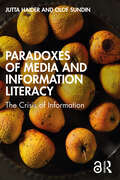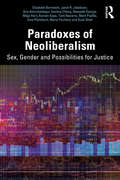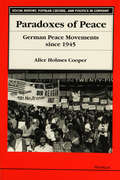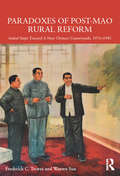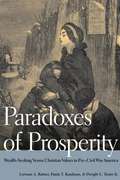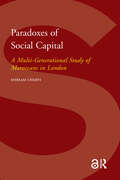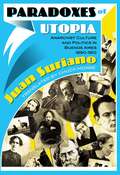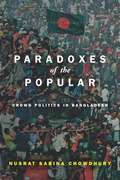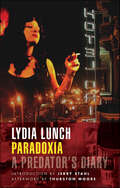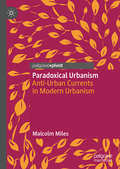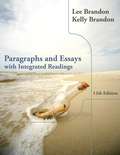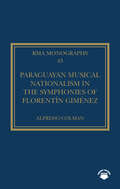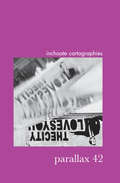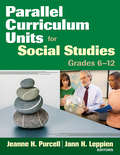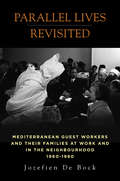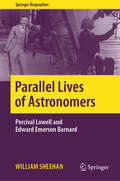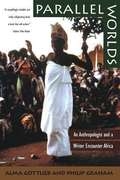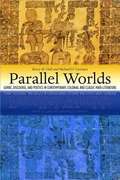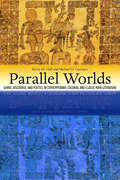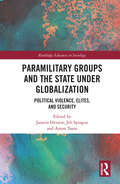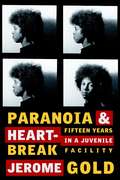- Table View
- List View
Paradoxes of Media and Information Literacy: The Crisis of Information
by Jutta Haider Olof SundinParadoxes of Media and Information Literacy contributes to ongoing conversations about control of knowledge and different ways of knowing. It does so by analysing why media and information literacy (MIL) is proposed as a solution for addressing the current information crisis. Questioning why MIL is commonly believed to wield such power, the book throws into sharp relief several paradoxes that are built into common understandings of such literacies. Haider and Sundin take the reader on a journey across different fields of practice, research and policymaking, including librarianship, information studies, teaching and journalism, media and communication and the educational sciences. The authors also consider national information policy proposals and the recommendations of NGOs or international bodies, such as UNESCO and the OECD. Showing that MIL plays an active role in contemporary controversies, such as those on climate change or vaccination, Haider and Sundin argue that such controversies challenge existing notions of fact and ignorance, trust and doubt, and our understanding of information access and information control. The book thus argues for the need to unpack and understand the contradictions forming around these notions in relation to MIL, rather than attempting to arrive at a single, comprehensive definition. Paradoxes of Media and Information Literacy combines careful analytical and conceptual discussions with an in-depth understanding of information practices and of the contemporary information infrastructure. It is essential reading for scholars and students engaged in library and information studies, media and communication, journalism studies and the educational sciences.
Paradoxes of Neoliberalism: Sex, Gender and Possibilities for Justice (Social Justice)
by Janet Jakobsen and Elizabeth BernsteinFrom the rise of far-right regimes to the tumult of the COVID-19 pandemic, recent years have brought global upheaval as well as the sedimentation of longstanding social inequalities. Analyzing the complexities of the current political moment in different geographic regions, this book addresses the paradoxical persistence of neoliberal policies and practices, in order to ground the pursuit of a more just world. Engaging theories of decoloniality, racial capitalism, queer materialism, and social reproduction, this book demonstrates the centrality of sexual politics to neoliberalism, including both social relations and statecraft. Drawing on ethnographic case studies, the authors show that gender and sexuality may be the site for policies like those pertaining to sex trafficking, which bundle together economics and changes to the structure of the state. In other instances, sexual politics are crucial components of policies on issues ranging from the growth of financial services to migration. Tracing the role of sexual politics across different localities and through different political domains, this book delineates the paradoxical assemblage that makes up contemporary neoliberal hegemony. In addition to exploring contemporary social relations of neoliberal governance, exploitation, domination, and exclusion, the authors also consider gender and sexuality as forces that have shaped myriad forms of community-based activism and resistance, including local efforts to pursue new forms of social change. By tracing neoliberal paradoxes across global sites, the book delineates the multiple dimensions of economic and cultural restructuring that have characterized neoliberal regimes and emergent activist responses to them. This innovative analysis of the relationship between gender justice and political economy will appeal to: interdisciplinary scholars in social and cultural studies; legal and political theorists; and the wide range of readers who are concerned with contemporary questions of social justice.
Paradoxes of Peace: German Peace Movements Since 1945 (Social History, Popular Culture, And Politics In Germany)
by Alice Holmes CooperGiven the militarism of the Empire and Nazi Germany, why did postwar West Germany experience massive waves of peace protest in the 1950s, 1960s, and 1980s? How have postwar peace movements shaped German political culture? Will the cultural norms that frown on the use of military force constrain foreign policy in the new, unified, Germany? In Paradoxes of Peace, Alice Holmes Cooper traces the evolution of peace movements in West Germany (1945-90) and in united Germany since 1990. Cooper examines the domestic and international constellations that gave rise to the peace movements, the sources of their multi-faceted ideologies and participants, and their organizational structures and strategies. The author then investigates the peace movement's response to the challenges of the post-Cold War world. Whereas previous work on German peace movements has concentrated on one period of mobilization or on elite security-policy debates, this comprehensive study examines all phases of mobilization since 1945, taking into account the full spectrum of actors, movement organization and strategy, and the broad political, social, and economic environments spawning peace protest. Arguing that theories of resource mobilization, changes in values, and crises of modernity are insufficient to explain peace movements, Paradoxes of Peace tailors a "political process" approach to postwar German movements. It investigates the political opportunities--the changing domestic and international constellation--which most favored peace mobilization since 1945. It examines the process through which the peace movement transformed popular consciousness and created a peace constituency. It analyzes how German peace movements gradually built an indispensable organizational infrastructure autonomous from parties and other social institutions. Cooper argues that the convergence of these factors determined the movement's capacity to mobilize and have political impact and allowed these to grow over time. Alice Holmes Cooper is Assistant Professor of Government, University of Virginia.
Paradoxes of Post-Mao Rural Reform: Initial Steps toward a New Chinese Countryside, 1976-1981
by Warren Sun Frederick C. TeiwesThe decollectivization of Chinese agriculture in the early post-Mao period is widely recognized as a critical part of the overall reform program. But the political process leading to this outcome is poorly understood. A number of approaches have dominated the existing literature: 1) a power/policy struggle between Hua Guofeng’s alleged neo-Maoists and Deng Xiaoping’s reform coalition; 2) the power of the peasants; and 3) the leading role of provincial reformers. The first has no validity, while second and third must be viewed through more complex lenses. This study provides a new interpretation challenging conventional wisdom. Its key finding is that a game changer emerged in spring 1980 at the time Deng replaced Hua as CCP leader, but the significant change in policy was not a product of any clash between these two leaders. Instead, Deng endorsed Zhao Ziyang’s policy initiative that shifted emphasis away from Hua’s pro-peasant policy of increased resources to the countryside, to a pro-state policy that reduced the rural burden on national coffers. To replace the financial resources, policy measures including household farming were implemented with considerable provincial variations. The major unexpected production increases in 1982 confirmed the arrival of decollectivization as the template on the ground. The dynamics of this policy change has never been adequately explained. Paradoxes of Post-Mao Rural Reform offers a deep empirical study of critical developments involving politics from the highest levels in Beijing to China’s villages, and in the process challenges many broader accepted interpretations of the politics of reform. It is essential reading for students and scholars of contemporary Chinese political history.
Paradoxes of PrEP for HIV Prevention
by Morten SkovdalAvailable open access digitally under CC-BY licence. Pre-exposure prophylaxis (PrEP) is a drug taken by HIV-negative people that reduces the risk of getting HIV. Comparing two case studies in Denmark and Zimbabwe, this book demonstrates six paradoxes that users often encounter in navigating their PrEP journey. These paradoxes lead to contentions, uncertainties, dilemmas and ambiguities that need to be carefully and pensively responded to through what the author terms ‘everyday PrEP negotiations’. The social nature and need for such everyday PrEP negotiations help explain why PrEP works for some people and not for others. This book argues that such insight is critical to make PrEP work for more people and to inform social public health responses.
Paradoxes of Prosperity: Wealth Seeking in Pre-Civil War America
by Lorman A. Ratner Dwight L. Teeter Jr. Paula T. KaufmanIn the midst of the United States' immense economic growth in the 1850s, Americans worried about whether the booming agricultural, industrial, and commercial expansion came at the price of cherished American values such as honesty, hard work, and dedication to the common good. Was the nation becoming greedy, selfish, vulgar, and cruel? Was there such a thing as too much prosperity? At the same time, the United States felt the influence of the rise of popular mass-circulation newspapers and magazines and the surge in American book publishing. Concern over living correctly as well as prosperously was commonly discussed by leading authors and journalists, who were now writing for ever-expanding regional and national audiences. Women became more important as authors and editors, giving advice and building huge markets for women readers, with the magazine Godey's Lady's Book and with e expressing women's views about the troubled state of society. Best-selling male writers--including novelist George Lippard, historian George Bancroft, and travel writer Bayard Taylor--were among those adding their voices to concerns about prosperity and morality and about America's place in the world. Writers and publishers discovered that a high moral tone could be exceedingly good for business. The authors of this book examine how popular writers and widely read newspapers, magazines, and books expressed social tensions between prosperity and morality. This study draws on that nationwide conversation through leading mass media, including circulation-leading newspapers, the New York Herald and the New York Tribune, plus prominent newspapers from the South and West, the Richmond Enquirer and the Cincinnati Enquirer. Best-selling magazines aimed at middle-class tastes, Harper's Magazine and the Southern Literary Messenger, added their voices, as did two leading business magazines.
Paradoxes of Social Capital: A Multi-Generational Study of Moroccans in London (IMISCOE Dissertations)
by Myriam ChertiParadoxes of Social Capital critically examines the robustness of social capital theory as an analytical tool in explaining the various 'integration' patterns amongst Moroccans in London. The book also considers how structural factors impact on the ways in which Moroccans, across generations, sustain, access and use social capital at the levels of family, ethnic community, migrant associations and schools. Furthermore, this research elaborates on how social capital serves as an identity (re)source that is continuously negotiated and redefined through (in)active group (family, ethnic, religious and national) memberships. An original model of studying the second-generation processes of adaptation, viewed as 'transversal adaptation'- is also introduced, shifting the focus from predetermined 'integration' patterns to a circular and a longitudinal approach to 'integration', where new opportunities and constraints emerge, structured by the temporal flow of life trajectories.
Paradoxes of Utopia
by Juan SurianoAn engaging historical look at fin de siécle Buenos Aires that brings to life the vibrant culture behind one of the world's largest anarchist movements: the radical schools, newspapers, theaters, and social clubs that made revolution a way of life. Cultural history in the best sense, Paradoxes of Utopia explores how a revolutionary ideology was woven into the ordinary lives of tens of thousands of people, creating a complex tapestry of symbols, rituals, and daily practices that supported-and indeed created the possibility of-the Argentine labor movement.Juan Suriano is a professor of social history at the University of Buenos Aires.
Paradoxes of the Popular: Crowd Politics in Bangladesh (South Asia in Motion)
by Nusrat Sabina ChowdhuryFew places are as politically precarious as Bangladesh, even fewer as crowded. Its 57,000 or so square miles are some of the world's most inhabited. Often described as a definitive case of the bankruptcy of postcolonial governance, it is also one of the poorest among the most densely populated nations. In spite of an overriding anxiety of exhaustion, there are a few important caveats to the familiar feelings of despair—a growing economy, and an uneven, yet robust, nationalist sentiment—which, together, generate revealing paradoxes. In this book, Nusrat Sabina Chowdhury offers insight into what she calls "the paradoxes of the popular," or the constitutive contradictions of popular politics. The focus here is on mass protests, long considered the primary medium of meaningful change in this part of the world. Chowdhury writes provocatively about political life in Bangladesh in a rich ethnography that studies some of the most consequential protests of the last decade, spanning both rural and urban Bangladesh. By making the crowd its starting point and analytical locus, this book tacks between multiple sites of public political gatherings and pays attention to the ephemeral and often accidental configurations of the crowd. Ultimately, Chowdhury makes an original case for the crowd as a defining feature and a foundational force of democratic practices in South Asia and beyond.
Paradoxia: A Predator's Diary
by Lydia LunchThe unspeakable sexual confessions of underground legend Lydia Lunch.—Included in Flavorwire’s “An Essential Punk Literature Reading List"“Paradoxia is compelling, exhilarating, and infinitely readable.” —PaperParadoxia contains frank and often shocking confessions. Lydia Lunch relays in graphic detail a predator’s diary, revealing the true psychic repercussions of sexual misadventure. From New York to London to New Orleans, Paradoxia is an uncensored, novelized account of one woman’s assault on the male of the species.
Paradoxical Urbanism: Anti-Urban Currents in Modern Urbanism
by Malcolm MilesModernist urbanism seems progressive, even Utopian: design for a better world through a democratic and humane built environment. But two currents undermine this vision from within: an Arcadianism which turns to a rural idyll as retreat from change and the effects of industrialization; and an instrumentalism by which the humane vision becomes prescriptive and anti-democratic. Malcolm Miles argues that these two currents undermine modernism’s progressive vision. This book examines the roots of modernist urbanism in the seamless, self-contained systems of Cartesian space; and identifies contradictions within modernist urbanism in its instrumentalism and reliance on de-politicised professional expertise. Miles adroitly reviews the postmodern culture of industrial ruinscapes; and posits that if cities are to be places of proximity, diversity, mobility and agency, this will require a move from modernist instrumentalism to a creative and radically democratic co-production of the built environment.
Paragraphs and Essays: With Integrated Readings (12th Edition)
by Kelly Brandon Lee BrandonThis classic text offers comprehensive, proven instruction in developmental writing. Paragraphs and Essays: With Integrated Readings is the higher-level companion to Sentences, Paragraphs, and Beyond in the bestselling two-book Brandon series. Instruction in this text--comprehensive, flexible, and relevant--is predicated on the idea that reading and writing are linked and that good writing is the product of thoughtful and systematic revision.
Paraguayan Musical Nationalism in the Symphonies of Florentín Giménez (Royal Musical Association Monographs)
by Alfredo ColmanThis study of the music and career of Florentín Giménez discusses the various ways in which he expressed his Paraguayan cultural identity and musical nationalism through his symphonies.Florentín Giménez (1925–2021) stands as one of the most prolific Paraguayan composers of both concert and folk music-style works. Colman argues that not only Giménez’s musical nationalism was a lens to reflect an ideal Paraguayan cultural identity, but indeed a means to develop it. Topics are approached with a threefold goal in mind: to provide a biography of the composer, to consider the various cultural themes associated with his compositions, and to give an overview of his symphonies. A chronological list of his compositions—including the dates of their premieres, soloists, ensembles, and conductors—appears in the Appendix as a reference guide.
Parallax: 13.1
by Mark Dawson Eve Kalyva Igor CassarThis book presents themed issues to provoke exploratory, interdisciplinary thinking and response. It provides a forum for a wide spectrum of perspectives on a topical question or concern. The book will be of interest to those working in cultural studies, critical theory, and cultural history.
Parallel Curriculum Units for Social Studies, Grades 6-12
by Dr Jann H. Leppien Dr Jeanne H. PurcellCovering history, geography, and sociology, these sample lessons and units show how to use the Parallel Curriculum Model to provide rigorous learning opportunities for students in social studies.
Parallel Justice for Victims of Crime
by Susan HermanFocuses on justice served for both the offender and the crime. Most are the time where all our attention is directed towards the justice for the victim to the offendor; here it's our obligation to bring the offender to the bar to be questioned, determine whether as law was broken, and if so sanction him/her with the appropriate punishment in accordance of the law broken. What happens after all this is done? Parallel justice is rooted in Justice to the victims, true justice involves seeking to heal the wounds of those who have suffered and those that have violated the law.
Parallel Lives Revisited: Mediterranean Guest Workers and their Families at Work and in the Neighbourhood, 1960-1980
by Jozefien De BockOriginally coined in 2001 in a report on racial tensions in the United Kingdom, the concept of “parallel lives” has become familiar in the European discourse on immigrant integration. There, it refers to what is perceived as the segregation of immigrant populations from the rest of society. However, the historical roots of this presumed segregation are rarely the focus of discussion. Combining quantitative analysis, archival research, and over one hundred oral history interviews, Parallel Lives Revisited explores the lives of immigrants from six Mediterranean countries in a postwar Belgian city to provide a fascinating account of how their experiences of integration have changed at work and in their neighborhoods across two decades.
Parallel Lives of Astronomers: Percival Lowell and Edward Emerson Barnard (Springer Biographies)
by William SheehanUsing the "Parallel Lives" approach adopted by the Greek biographer Plutarch, noted historian of astronomy William Sheehan contrasts the lives and research careers of two famous astronomers, Percival Lowell and Edward Emerson Barnard. Drawing on vast archival materials and hitherto unpublished source materials, Sheehan documents in detail the contributions of these two late 19th and early 20th astronomers. Living at a time when controversies about Mars peaked, when great observatories were being built, and when research increasingly turned away from the Solar System toward the stellar and extra-galactic universe, these observers made spectacular contributions to astronomy. Their work still inspires, and continues in Perseverance rover's explorations of the surface of Mars carrying forward Lowell's dream of showing that Mars may once have been "the abode of life," and in Barnard's pioneering wide-angle photographs of the Milky Way which first showed the sweep, majesty and complexity of the Galaxy. The work of decades of research and writing, Sheehan has produced what is likely to become the definitive work on these two great astronomers. "Parallel Lives marks an important contribution to the history of astronomy. The book is masterful and inventive. William Sheehan could hardly have chosen two more compelling—or contrasting—personalities to analyze in this fascinating dual biography." - David Baron, author of American Eclipse and The Martians, and former Chair in Astrobiology at the Library of Congress. "Sheehan has united scientific acumen, detailed historical research, penetrating insight into character, and narrative virtuosity—and adapted it all to an ancient Greek model—a remarkable achievement!" - Michael Armstrong, Assoc. Prof. Emeritus of Classics, Hobart and William Smith Colleges, Geneva NY William Sheehan's many books include the authoritative biography The Immortal Fire Within: The Life and Work of Edward Emerson Barnard and (with Jim Bell) Discovering Mars: A History of Observation and Exploration of the Red Planet, which has been called the "gold standard of books on Mars" (Michio Kaku).
Parallel Lives: An Empirical Exploration of the Concept of Generation
by Calin GoinaThis book explores the articulation between macro-social historical transformations and the opportunities and constraints that the resultant political and property regimes presented for villagers. It builds on ethnographic analyses of rural Eastern Europe by adding an historical analysis of the configurations and reconfigurations of life trajectories across three successive generations. The villagers studied lived a succession of property and political configurations: democratic and authoritarian regimes grounded in free market and private property until 1947, a totalitarian regime of state-socialism until 1989, and a liberal democracy re-building a free market economy from 1990 until today. It also brings forward an empirical exploration of the concept of generation, grounded on a re-reading of Karl Mannheim. The book is distinctive in its historical breath, covering a century via a detailed, rich ethnographic study, that includes a diversity of social positions (from the richest members of the community to those of very poor means) and a diversity of three ethnicities and religions.
Parallel Worlds: An Anthropologist and a Writer Encounter Africa
by Philip Graham Alma GottliebThis suspenseful and moving memoir of Africa recounts the experiences of Alma Gottlieb, an anthropologist, and Philip Graham, a fiction writer, as they lived in two remote villages in the rain forest of Cote d'Ivoire. With an unusual coupling of first-person narratives, their alternate voices tell a story imbued with sweeping narrative power, humility, and gentle humor. Parallel Worlds is a unique look at Africa, anthropological fieldwork, and the artistic process. "A remarkable look at a remote society [and] an engaging memoir that testifies to a loving partnership . . . compelling. "—James Idema, Chicago Tribune
Parallel Worlds: Genre, Discourse, and Poetics in Contemporary, Colonial, and Classic Maya Literature
by Michael D. Carrasco Kerry M. HullDespite recent developments in epigraphy, ethnopoetics, and the literary investigation of colonial and modern materials, few studies have compared glyphic texts and historic Maya literatures. Parallel Worlds examines Maya writing and literary traditions from the Classic period until today, revealing remarkable continuities across time. In this volume, contributions from leading scholars in Maya literary studies examine Maya discourse from Classic period hieroglyphic inscriptions to contemporary spoken narratives, focusing on parallelism to unite the literature historically. Contributors take an ethnopoetic approach, examining literary and verbal arts from a historical perspective, acknowledging that poetic form is as important as narrative content in deciphering what these writings reveal about ancient and contemporary worldviews. Encompassing a variety of literary motifs, including humor, folklore, incantation, mythology, and more specific forms of parallelism such as couplets, chiasms, kennings, and hyperbatons, Parallel Worlds is a rich journey through Maya culture and pre-Columbian literature that will be of interest to students and scholars of anthropology, ethnography, Latin American history, epigraphy, comparative literature, language studies, indigenous studies, and mythology.
Parallel Worlds: Genre, Discourse, and Poetics in Contemporary, Colonial, and Classic Maya Literature (G - Reference, Information And Interdisciplinary Subjects Ser.)
by Michael D. Carrasco Kerry M. HullDespite recent developments in epigraphy, ethnopoetics, and the literary investigation of colonial and modern materials, few studies have compared glyphic texts and historic Maya literatures. Parallel Worlds examines Maya writing and literary traditions from the Classic period until today, revealing remarkable continuities across time. In this volume, contributions from leading scholars in Maya literary studies examine Maya discourse from Classic period hieroglyphic inscriptions to contemporary spoken narratives, focusing on parallelism to unite the literature historically. Contributors take an ethnopoetic approach, examining literary and verbal arts from a historical perspective, acknowledging that poetic form is as important as narrative content in deciphering what these writings reveal about ancient and contemporary worldviews. Encompassing a variety of literary motifs, including humor, folklore, incantation, mythology, and more specific forms of parallelism such as couplets, chiasms, kennings, and hyperbatons, Parallel Worlds is a rich journey through Maya culture and pre-Columbian literature that will be of interest to students and scholars of anthropology, ethnography, Latin American history, epigraphy, comparative literature, language studies, indigenous studies, and mythology.
Paramilitary Groups and the State under Globalization: Political Violence, Elites, and Security (Routledge Advances in Sociology)
by Jeb Sprague Jasmin Hristov Aaron TaussThis book examines the phenomenon of paramilitarism across Latin America and the Caribbean, Eastern Europe, Africa, and Asia, offering a nuanced perspective while identifying key patterns in the way paramilitary violence is implicated in processes of capital accumulation, state-building, and the reproduction of social power. Paramilitary violence, a key modality of coercion in the era of globalization, has been pursued by states and dominant classes in the Global South, to reproduce or extend their power over subaltern groups. Paramilitary groups are responsible for atrocities, including extrajudicial executions, disappearances, torture, rape, and forced displacement. The book integrates empirically rich investigations into an emergent theory of political violence, capturing the relationship between parastatal armed actors, capital, and the state. The analysis sheds light on globally relevant phenomena such as the end of the Cold War, the shifting role of US hegemony, and evolving nature of the nation-state. The book is suitable for academics, graduate and upper-year undergraduate students, and policy-makers in development, human rights, and violence prevention. Given its interdisciplinary subject, it appeals to scholars from a wide range of disciplines, including political science, sociology, political anthropology, development, peace and conflict, security and terrorism, international relations, and global studies.
Paranatures in Culinary Culture: An Alimentary Ecology
by Thomas R. ParkerUncovering the intricate cultural threads that inform our dietary practicesParanatures in Culinary Culture embarks on a gastronomic odyssey, redefining foods we thought we knew and revealing the extraordinary stories of ordinary ingredients and the cultural forces shaping our diets. The book begins with a simple premise: to eat is to assimilate the outer world into the inner body, both physically and mentally. But what happens when this assimilation process goes awry? Thomas R. Parker reveals how culinary staples are not only elements of identity formation but also instruments of cultural disruption when their true nature emerges and challenges our preconceptions. Parker explores how certain foods—bread, oysters, pigs, cheese, and wine—can both create and destabilize narratives, unsettle assimilation, and decenter Western culinary traditions. Taking inspiration from architectural historian David Gissen&’s concept of &“subnature&” and Michel Serres&’s idea of the &“parasite,&” Parker develops the concept of paranatures: flavors, foods, and practices considered unpalatable by different societies at different times. He reveals how certain ordinary foods live parallel paranatural lives, addressing larger issues of colonial and postcolonial food theory and challenging long-held notions that cuisine was meant to uphold. Serving up a rich blend of history, culture, and gastronomy, Parker leads readers to perceive food as an adventure, inviting them to taste the untamed side of nature. He offers a thought-provoking invitation to reconceptualize the roles and narratives we assign to the natural world and its produce, allowing us to see food, nature, and ourselves in new ways.
Paranoia & Heartbreak: Fifteen Years in a Juvenile Facility
by Jerome GoldFor fifteen years, Jerome Gold worked as a rehabilitation counselor in a prison for juveniles in Washington state. Throughout his time there, he kept a journal of his experiences with youths who had been incarcerated for murder, kidnap, assault, rape and other sex offenses, auto theft, burglary, and selling drugs. What started as a journal designed to relieve stress turned into the evocation of one man's nuanced perspective on a unique group of young people. Paranoia & Heartbreak tells Gold's personal story of coming to terms with people who have crossed over to the other side of their own humanity. Writing from ample experience and with unflinching compassion, Gold brings the reader to see these "deviants"--and through them, in some slanted way, our whole society, with an unexpected intensity.
